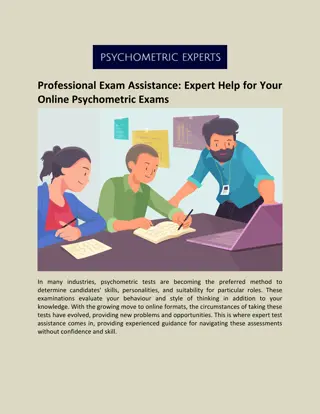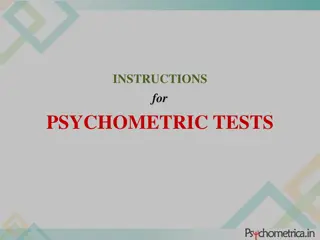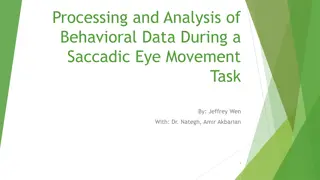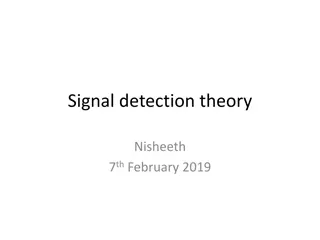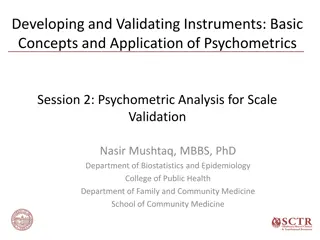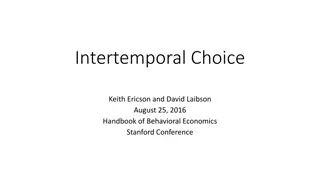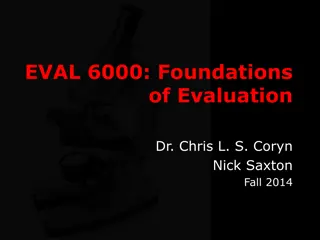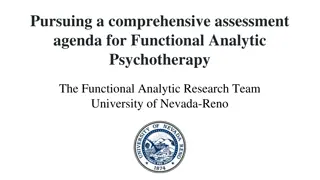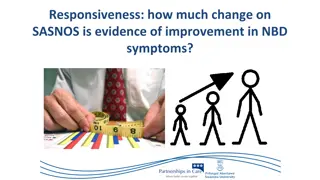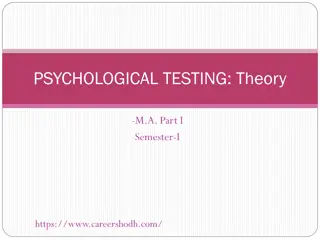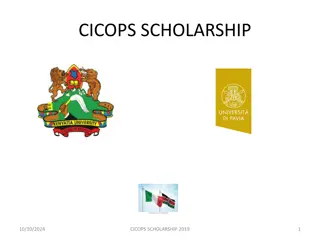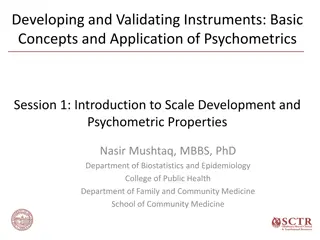Actions Emanating from the Evaluation of the Governance Reform
The evaluation of the governance reform within the WMO aimed to assess its alignment with strategic objectives, effectiveness in responding to societal needs, coordination efficiency, decision-making process, agility, and more. Evaluation criteria included relevance, design validity, effectiveness,
1 views • 13 slides
Expert Help: Pay Someone to Take My Online Straighterline Class for Me
In order to improve candidates' performance and confidence in educational, recruitment, and professional certification examinations, Pay Someone to Take My Psychometric Exam for Me services provide candidates with expert guidance, practice exams, and
5 views • 6 slides
Comprehensive School Quality Assurance and Evaluation Process
A detailed insight into the Quality Assurance Department's role in school evaluation and improvement processes, including Whole School Evaluation (WSE), Follow-through initiatives, Teaching and Learning assessments, Resumption and Examination Monitoring. The process involves both internal self-evalu
0 views • 20 slides
Methods of Training Evaluation: Overview and Importance
Training and development are fast-growing fields globally, including in India. Evaluation plays a crucial role in understanding the effectiveness and efficiency of training programs for human resource development. This presentation covers the concept of training, evaluation strategies, methods/model
0 views • 61 slides
Universal Evaluation Framework: Simplifying Evaluation Processes
This session introduces the Universal Evaluation Framework (UEF) developed for evaluating QAA Scotland Enhancement Themes. Participants learn key evaluation questions, evidence capture, and the Theory of Change to enhance evaluation confidence. The QAA Scotland Evaluation Odyssey details historical
2 views • 14 slides
Implementing Blind Evaluation Pilot in HORIZON EUROPE: Key Facts and Process
HORIZON EUROPE is conducting a pilot on Blind Evaluation in the 2023-2024 work program to address biases in the research and innovation evaluation process. The pilot aims to assess the feasibility of blind evaluations in ensuring fairness and mitigating potential biases towards well-known organizati
9 views • 9 slides
Strengthening National Evaluation Capacity in the Era of Sustainable Development Goals
The presentation by Vijayalakshmi Vadivelu at the National Evaluation Capacities Conference 2017 in Istanbul focused on the importance of strengthening national evaluation capacity in alignment with the Sustainable Development Goals (SDGs). The content covers the holistic approach to national evalua
3 views • 18 slides
Exploring Developmental Evaluation for Better Decision-Making
Delve into the realm of developmental evaluation, focusing on its purpose, principles, and application in practice. Understand how developmental evaluation emphasizes real-time data collection for informed decision-making in complex systems. Learn about key principles such as developmental purpose,
0 views • 25 slides
Evaluation Practices in Macedonia: What Works, What Doesn't
The comparison between the effectiveness of evaluation practices and the presence of formal institutions in Macedonia raises questions about the impact of institutional design on outcomes. While some countries with robust evaluation institutions fall short in practice, others lacking such structures
1 views • 7 slides
Enhancing Evaluation Capabilities in Mongolia for Agenda 2030
The Mongolian Evaluation Network in collaboration with UNDP is working to integrate the 2030 Agenda into national strategies and plans, establish institutional coordination mechanisms, align budgets, and enhance data monitoring systems. Key stakeholders including government agencies, NGOs, and inter
0 views • 9 slides
Understanding Demi-Regularity in Realist Evaluation
Realist Evaluation is a theory-driven approach focusing on understanding the context and mechanisms of action behind policies and interventions. This webinar explores the concept of demi-regularity in realist evaluation, its origins, and its application in analyzing complex evidence. Key aspects cov
1 views • 16 slides
Psychometric Tests Overview: MAP, SPM, Observation Test
Explore three different psychometric tests - Multi-Dimensional Assessment of Personality (MAP), Standard Progressive Matrices (SPM), and Observation Test. MAP assesses personality dimensions, SPM measures intelligence through abstract reasoning, and the Observation Test evaluates your power of obser
4 views • 14 slides
Behavioral Data Analysis During Saccadic Eye Movement Task
Visual systems utilize saccades to focus on objects, impacting temporal perception. This study explores the effects of saccades and stimulus location on perceived time, presenting findings from an experiment on temporal perception mapping with fixed visual duration. The method of psychometric functi
0 views • 12 slides
Psychometric Performance of PACADI Score in Pancreatic Cancer Patients
This study at IHPBA 2018 evaluated the psychometric performance of the Pancreatic Cancer Disease Impact (PACADI) score in patients with suspected pancreatic cancer. The research included 363 patients and assessed various aspects such as discriminative validity, test-retest reliability, and predictiv
0 views • 7 slides
Understanding Evaluation in Education
Evaluation in education is a comprehensive term that encompasses measurement, testing, and qualitative examination of student behavior. It involves both quantitative and qualitative descriptions, along with value judgments. Differentiating from mere measurement, evaluation provides a deeper analysis
0 views • 28 slides
Understanding Signal Detection Theory in Psychophysics
Signal Detection Theory in psychophysics quantifies how observers respond to signals in noise. It involves mathematical models like psychometric functions to measure bias and sensitivity in detecting stimuli. Key concepts include sensitivity and criterion in distinguishing signal perception and repo
6 views • 24 slides
Sustainable Evaluation Systems Workshop Summary
Workshop on Sustainable Evaluation Systems by Stephen Porter at the NEC Conference focused on defining evaluation systems, addressing their failures, and emphasizing the importance of quality, use, and networks in achieving sustainability. Participants engaged in activities such as bingo card introd
0 views • 38 slides
Strategic Management: Strategy Review and Evaluation
This chapter delves into the critical process of strategy review, evaluation, and control in strategic management. It covers the nature of strategy evaluation, effective evaluation systems, contingency planning, auditing, using computers for evaluation, and guidelines for effective strategic managem
1 views • 42 slides
Understanding Evaluation and Ideology in Translation
Evaluation plays a crucial role in the study of translation, influencing both meaning and value in communication. This evaluation is reflected through language elements like accentuation, deletion, and substitution. Appraisal, stance, and evaluation are key terms in linguistic analysis that focus on
2 views • 22 slides
Understanding Psychometric Analysis for Scale Validation
Explore the key concepts of psychometric analysis to validate measurement instruments. Delve into reliability assessments like split-half reliability and Cronbach's alpha for internal consistency. Gain insights into statistical methods for evaluating psychometric properties of scales.
0 views • 95 slides
Impact and Evaluation Toolkit for Churches and Christian Charities
This toolkit aims to equip churches and Christian charities engaged in small-scale social action projects to think about impact, measure impact, choose data tools, reflect on evaluation data, and use it effectively. It covers principles of evaluation, setting objectives, selecting indicators, storyt
0 views • 34 slides
Evaluation Metrics for IEEE 802.11-14/0107 HEW Proposal
Evaluation metrics play a crucial role in assessing WLAN system performance and achieving the objectives of High Efficiency WLAN (HEW). This proposal by Yonggang Fang et al. from ZTE outlines the key evaluation metrics recommended for evaluating HEW performance, including area throughput, average th
0 views • 12 slides
Psychometric Properties of Values Acceptance Mindfulness Scale (VAMS) for Ice Hockey Players
Preliminary psychometric properties of the Values Acceptance Mindfulness Scale (VAMS) for ice hockey players were evaluated with a sample of elite senior, youth, and women players. The VAMS demonstrated strong correlations with quality of life, depression, anxiety, stress, and experiential avoidance
0 views • 12 slides
Overview of Monitoring and Evaluation in the GEF
The Evaluation in the GEF and Training Module focuses on promoting accountability and learning within the Global Environment Facility (GEF) through monitoring and evaluation activities. The GEF Independent Evaluation Office plays a crucial role in assessing results, effectiveness, and performance of
0 views • 25 slides
Chile Country Portfolio Evaluation 2010-2014 Summary
Evaluation process of Chile's country portfolio from 2010-2014 included pre-evaluation, during evaluation, and results/conclusions phases. Challenges like defining scope and participant concerns were addressed. Preliminary conclusions were presented to stakeholders, leading to a trustful and represe
1 views • 6 slides
Potential Amendments for Reforming REACH Evaluation Process
Discussion at the Ad-hoc Meeting of Competent Authorities for REACH and CLP focused on potential options for amending the REACH Regulation to reform the evaluation process. Topics included registration-related measures, substance evaluation, testing proposals, compliance checks, and expectations dur
0 views • 30 slides
Understanding Self-Realization and Balancing Left/Right Side Personality
Self-realization through understanding the subtle body's channels and chakras helps achieve emotional, physical, mental, and spiritual balance. The left side of the body is associated with past, desires, and emotions; imbalances can lead to negative emotions and psychometric diseases. Balancing tech
0 views • 17 slides
Intertemporal Choice and Behavioral Economics Overview
Explore present-focused models, empirical regularities, and open questions related to intertemporal choice in behavioral economics. Concepts like hyperbolic discounting, dual-self models, psychometric distortions, and myopia are discussed using insights from prominent figures like David Hume, Plato,
0 views • 37 slides
Developing an Evaluation Work Plan for Effective Program Assessment
This presentation by Amy D. Andrade from San Jose State University focuses on developing an Evaluation Work Plan to identify responsibilities and timelines. It covers topics such as Evaluation Coaching Support, Webinar Outlines, Logic Model, Inputs-Outputs-Outcomes, Two Approaches to Evaluation, Pro
0 views • 29 slides
Foundations of Evaluation - Conference Experience and Approaches
The Foundations of Evaluation course covers diverse topics such as improvement- and accountability-oriented evaluation approaches, social agenda evaluation, and eclectic approaches. The course material includes insights on decision- and accountability-oriented studies, methods for program improvemen
0 views • 29 slides
Evaluation Synthesis in Changing Contexts: Enhancing Knowledge for Development Effectiveness
Evaluation synthesis is crucial for promoting learning, reflection, and decision-making in development work. This process involves bringing together diverse knowledge sources to generate strategic insights and facilitate wider use of evaluation findings. The Independent Office of Evaluation of IFAD
0 views • 20 slides
Comprehensive Assessment Agenda for Functional Analytic Psychotherapy
Pursuing a comprehensive assessment agenda in Functional Analytic Psychotherapy involves psychometric measurement of interactions in and out of session. The research team at the University of Nevada-Reno discusses the goals, challenges, and tools essential for behavior therapists and researchers, ai
0 views • 25 slides
Evaluation of FME Zero Emission Neighbourhoods in Smart Cities
The mid-term evaluation process of FME Zero Emission Neighbourhoods in Smart Cities involves self-evaluation, partner evaluation, and panel evaluation. The procedure includes scientific review, evaluation by scholars, and innovation assessment. Key documents like self-reports, progress reports, and
1 views • 20 slides
Understanding Responsiveness in Measuring Outcomes for NBD Symptoms
Responsiveness is crucial in evaluating the effectiveness of treatments for NBD symptoms. It involves detecting change through repeated measurements, but there is a lack of consensus and standardized methods. Key concepts include Minimally Detectable Change (MDC) and Minimally Important Change (MIC)
0 views • 33 slides
Overview of Regular Evaluation 2017 Findings in Estonia
In the Regular Evaluation 2017, efforts were made to maximize the benefits of evaluation outcomes for various stakeholders in Estonia such as the state, society, and institutions. The evaluation focused on a range of actions including preparing legislation, finding experts, creating self-report form
0 views • 6 slides
Comprehensive Guide to Training Evaluation Methods
This detailed guide covers the aim of evaluation, evaluation methods, techniques of evaluation, types of evaluation (formative, process, outcome, impact), and the significance of formative and process evaluation in assessing training effectiveness. Learn about the key principles and practices involv
0 views • 45 slides
Understanding Assessment Centres: Psychometric Tests, Situational Judgement, and More
Assessment centres often include psychometric tests, ability testing, and situational judgement assessments to evaluate candidates. These tests help employers understand your personality, behaviours, decision-making skills, and ability to work in different scenarios. By participating in these assess
0 views • 25 slides
Evolution of Psychological Testing: From Ancient Methods to Modern Applications
Delve into the historical journey of psychological testing, exploring its roots in ancient China and Greece, through the establishment of standardized testing systems in the 19th century, to the contributions of key figures like Francis Galton and Charles Spearman. Learn about the development of psy
0 views • 33 slides
Research Collaboration: Enhancing Parenting Interventions through Psychometric Tools
Research visit to the LAG Lab at the University of Pavia focuses on exploring evidence-based attachment parenting interventions and the use of psychometric tools to enhance parenting processes and outcomes. The collaboration aims to address the lacking research on emotional attachment and parenting
0 views • 10 slides
Introduction to Scale Development and Psychometric Properties
Delve into the fundamental concepts of classical test theory, various validity and reliability types, essential scale development components, and the significance of psychometric analysis. Explore key terms, measurement methods, latent variables, scales, and components in developing and validating i
0 views • 77 slides

